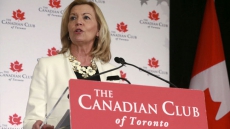EDMONTON — Alberta's finance minister says the province is on track for a record $5.9-billion deficit this year as the oil crunch hits families and businesses.
And Joe Ceci says the worst may not be over if low oil prices persist and the province continues in recession.
"If current conditions continue, the final deficit will be in the range of $6.5 billion," Ceci said Monday as he released first-quarter figures for the 2015-16 fiscal year which began April 1.
Ceci said the NDP government will continue to look for efficiencies, but will not engage in large-scale layoffs or deep cuts to erase the red ink.
"We are laser focused on taking positive steps toward economic recovery."
Opposition Wildrose finance critic Derek Fildebrandt calculated the hit to Alberta's treasury is actually $9 billion when $3 billion drained from the contingency fund and new borrowing for capital projects are added in.
"This is the largest hit that our province has taken to its net wealth in the history of the province, and that should be concerning," said Fildebrandt.
Monday's numbers are based on the budget introduced, but never passed, by former Progressive Conservative premier Jim Prentice's government before it was defeated by Rachel Notley and the NDP in May. That budget estimated a $5-billion deficit.
The new estimates reflect changes made by the NDP, including higher corporate and personal taxes, and more than a billion dollars in new spending for health, education and social services.
Ceci is to bring in a fully revised budget after the house resumes sitting Oct. 26.
Revenue is forecast at $44.3 billion — about $1 million higher than the Prentice budget. The increase is driven mainly by higher-than-expected oil revenue in the spring, more revenue from personal and business taxes and a lower Canadian dollar.
The benchmark North American price for oil, West Texas Intermediate, was originally expected to hover around US$55 a barrel, but in the first three months instead delivered almost $58.
But the revenue figure might shrink in the next update as the WTI price dropped below $40 a barrel in August before rebounding to almost $49 on Monday.
It's also a long way from the dizzying heights of US$100 a barrel reached in the summer of 2014.
Total government expenses are expected to be $50.2 billion, which is about $1.8 billion higher than projected in the Tory budget.
The increase is due mainly to $1.4 billion added by the NDP to health, education and social services, as well as to extra costs fighting drought and wildfires.
Debt for capital projects is at about $18 billion and the contingency fund, after the $3-billion withdrawal, will stand at $3.5 billion.
The longer term outlook is not rosy.
Real GDP is now forecast to drop by 0.6 per cent in 2015 and the number of unemployed in the province is expected to average 139,000 — up from 112,000 in 2014.
Oil and gas investment is expected to fall more than 30 per cent.
Primary household income is expected to grow by 2.5 per cent after almost eight per cent in average growth over the previous four years.
Overall retail sales have fallen 2.1 per cent so far this year. New vehicle sales have fallen by nine per cent.
Alberta Party Leader Greg Clark called on the government to immediately bring in a public sector hiring and wage freeze.
Liberal Leader David Swann said the NDP needs to get going on showing Albertans a plan to manage the economic slowdown.
Saskatchewan also announced its first-quarter numbers on Monday that include a forecast $292-million deficit due to low oil prices and the cost of fighting wildfires.
Saskatchewan projecting $292M deficit; province blames wildfires, low oil prices

REGINA — Saskatchewan is forecasting a $292-million deficit this year mainly due to low oil prices and the cost of fighting wildfires that forced thousands of people from their homes this summer.
Finance Minister Kevin Doherty announced the red ink Monday in the province's first-quarter report for the 2015-16 fiscal year.
The government projected a surplus of just under $107 million in its March budget.
"Lower oil prices combined with an unprecedented number of forest fires and the largest evacuation in Saskatchewan's history are putting pressure on the province's finances," Doherty said in a release.
Total revenue is forecast at $14 billion — down almost $238 million — with expenses up $161 million.
Doherty said the Saskatchewan Party government will work hard in the coming months to balance the books through what he called careful management and restraint. That includes unspecified cuts to discretionary spending and deferring some projects and programs.
"All ministries, Crown corporations and all government agencies are exercising spending restraint while ensuring we continue to provide vitals services."
The province estimates it will spend about $100 million more than originally budgeted on wildfires. Other expenses that are higher than expected include flood costs and additional services for family services and people with disabilities.
The NDP Opposition said the government was partly responsible for the projected deficit.
NDP deputy leader Trent Wotherspoon said the province should have had a better wildfire plan.
He also said the growing cost of the Regina Bypass project and money spent on consultants show the Saskatchewan Party are bad managers.
"This government hasn't been able to balance the budget on most years during the best years and has piled on debt every step of the way," he said.
The government is predicting its revenues based on a West Texas Intermediate oil price of US$49.50 a barrel, down from US$57.15.
Along with lower oil revenues, the province is forecasting decreased revenues from taxes, Crown land sales, uranium and coal.
On the plus side, potash revenues are projected to be higher due lower US-dollar potash prices.
The fiscal update says private-sector forecasters still expect Saskatchewan's economy to grow this year, but by 0.4 per cent, half of what was projected in March.
Doherty said the outlook for Saskatchewan remains positive due to its growing population, low unemployment and diversified economy.
Alberta also presented its first-quarter update on Monday. Finance Minister Joe Ceci said the province is on track to record a $5.9-billion deficit this year as the oil crunch hits families and businesses.
Oil and gas investment is expected to fall more than 30 per cent in Alberta, including sharp declines in retail sales.
Ceci said the deficit could grow to $6.5 billion if low oil prices persist.




